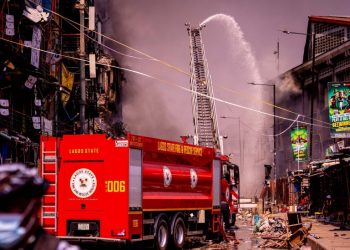The United Kingdom has begun a large-scale evacuation of British passport holders from Sudan on RAF flights, placing priority to the most vulnerable, including families with children and the elderly.
Prime Minister, Rishi Sunak who disclosed this on his social media platform Tuesday, paid tribute to the British Armed Forces, diplomats and Border Force staff carrying out this complex operation.
He said the UK will continue to work to end the bloodshed in Sudan and support a democratic government.

Meanwhile, following intense negotiation over the past 48 hours, Sudanese Armed Forces (SAF) and the Rapid Support Forces (RSF) have agreed to implement a nationwide ceasefire starting at midnight on April 24, to last for 72 hours.
The United States Secretary of State, Antony Blinken who met earlier in Washington Monday on the peace efforts with Kenya’s top diplomat and has held phone conversations with counterparts from Saudi Arabia and the United Arab Emirates.
According to the statement released by the State Department on Monday, to support a durable end to fighting, the United States will coordinate with regional and international partners, and Sudanese civilian stakeholders, to assist in the creation of a committee to oversee the negotiation.

The United States urged the SAF and RSF to immediately and fully uphold the ceasefire during the period of agreement while the Committee created will work on implementing a permanent cessation of hostilities and humanitarian arrangements in Sudan.
At least 427 people have been killed nationwide, and more than 3,700 people are injured, according to the World Health Organization (WHO), as of 21 April with acute shortages of food, water, medicines and fuel, and limited access to communications and electricity, continue to be reported.
The WHO verified 11 attacks on health-care facilities since the start of the fighting. The remaining facilities in Khartoum and Darfur states are stretched beyond capacity and nearly non-functional due to staff fatigue and lack of supplies.

Displacement of civilians has been reported in Khartoum, Northern, Blue Nile, North Kordofan, North Darfur, West Darfur and South Darfur states, and cross-border movements from Sudan to Chad, Egypt and South Sudan have been observed.
At least 238 South Sudanese people have returned from Sudan to South Sudan through Renk, according to IOM’s DTM, although this figure is expected to rise in the days ahead. There are also unconfirmed reports of cross-border movement through Northern State to Egypt.
There are also preliminary reports of at least 300 people fleeing from Khartoum arriving in Gedaref State, according to the Norwegian Refugee Council (NRC), who were trying to gather supplies before continuing to Port Sudan while those arriving reportedly said that nowhere was safe in Khartoum, Sudan’s capital city.
Until recently, the SAF, led by General Abdel al- Burhan, and the RSF Group, headed by General Mohamed Dagalo, were allies, worked together in 2019 in a popular uprising that overthrew Sudan’s brutal dictator, Omar al- Bashir, who ruled the country for three decades.












